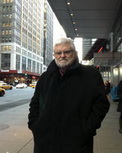 Chris
McDonnell, UK
Chris
McDonnell, UKchristymac733@gmail.com
 Chris
McDonnell, UK
Chris
McDonnell, UK
christymac733@gmail.com
Previous articles by Chris Comments welcome here
February 1, 2018

I
have always encouraged young people to ask questions, with one proviso,
that there may not be an easy answer or in some cases, no answer at all...
given those conditions, fire ahead!
The
response from the hierarchy has been the echo of silence; a pin dropped in
the dome of St Paul's Cathedral would have caused a greater sound wave.
However,
judging by the response in the letters columns of the Catholic press and
on websites, both at home and abroad, others felt differently. The New
Zealand bishops showed a far more considered response.
That
correspondence has included three letters published in the Tablet under
the signatures first of the Emeritus Bishop of Portsmouth, Crispian Hollis
(December 9th) followed
by that of the Emeritus Bishop of Brentwood, Thomas McMahon (December
23/30) and finally in the New Year that of John Crowley, Emeritus Bishop
of Middlesbrough (January 6th). Bishop Crowley's letter
concludes with this pertinent question.
'But
it is what happens next which has now become the key question. The members
of the Standing Committee of the Bishops’ Conference are pastoral men,
so they will be acutely aware that this issue will simply not go away and,
left to fester, could damage relationships of trust and confidence within
the Catholic community of England and Wales'.
All
three bishops regret their agreement to accept the 2011 text that has been
the cause of much heartache. If so little time was given to its
consideration when the bishops met, that in itself is a question that
sometime needs a response.
However
it is the question raised at the end of
Bishop Crowley's letter that should be of immediate interest for
since that November press conference we have heard no further comment from
our bishops. During recent months, 'Lost in Translation' (2017) by Gerald
O'Collins with John Wilkins has been published, making a significant
contribution to the discussion.
It
was of course preceded by
Bishop Maurice Taylor's book, 'It's
the Eucharist, thank God' (2009). In that book Bishop Taylor not only
offers teaching on the nature of Eucharist but also contributes a critical
analysis of the Translation story at the turn of the century. His voice is
important for he served for ten years representing Scottish bishops on the
International Commission for English in the Liturgy (ICEL) and for five
years, 1997-2002 was Chair of ICEL.
Both
articles offer an instructive read. Space makes it impossible to make
extensive quotations from either piece but the concluding remarks of the
most recent 'Magnum Principium' (Published
20 November 17) might suggest a partial answer to the question posed at
the end of Bishop Crowley's letter.
Maurice
Taylor writes:
'I
end with the proposal (here slightly expanded) with which I finished the
article of last May. Has the time for the 1998 translation, approved
by all the English-speaking bishops’ conferences but banned by the
Congregation for Divine Worship under the leadership of Cardinal Medina
Estévez (a non-English speaker), now arrived? Although the 1998
version needs some updating, mainly to include Masses for those made
saints in the last twenty years, it would be a great deal easier to
resuscitate it than to embark on yet another translation. Is that not the
road ahead that merits some serious consideration?'
We
certainly don't want to start again from ground zero when 17 years of
scholarship gave us the textual translation of 1998. It would take too
long and cost too much in both time and effort. If our bishops, both in
the UK and farther afield in those countries represented on ICEL, all of
whom accepted the 98 text, were to consider this option then we might move
forward.
What
cannot happen, must not happen, is that the question having been asked by
so many is left hanging in the air. That will not do. This is a question
that deserves an honest answer.
END